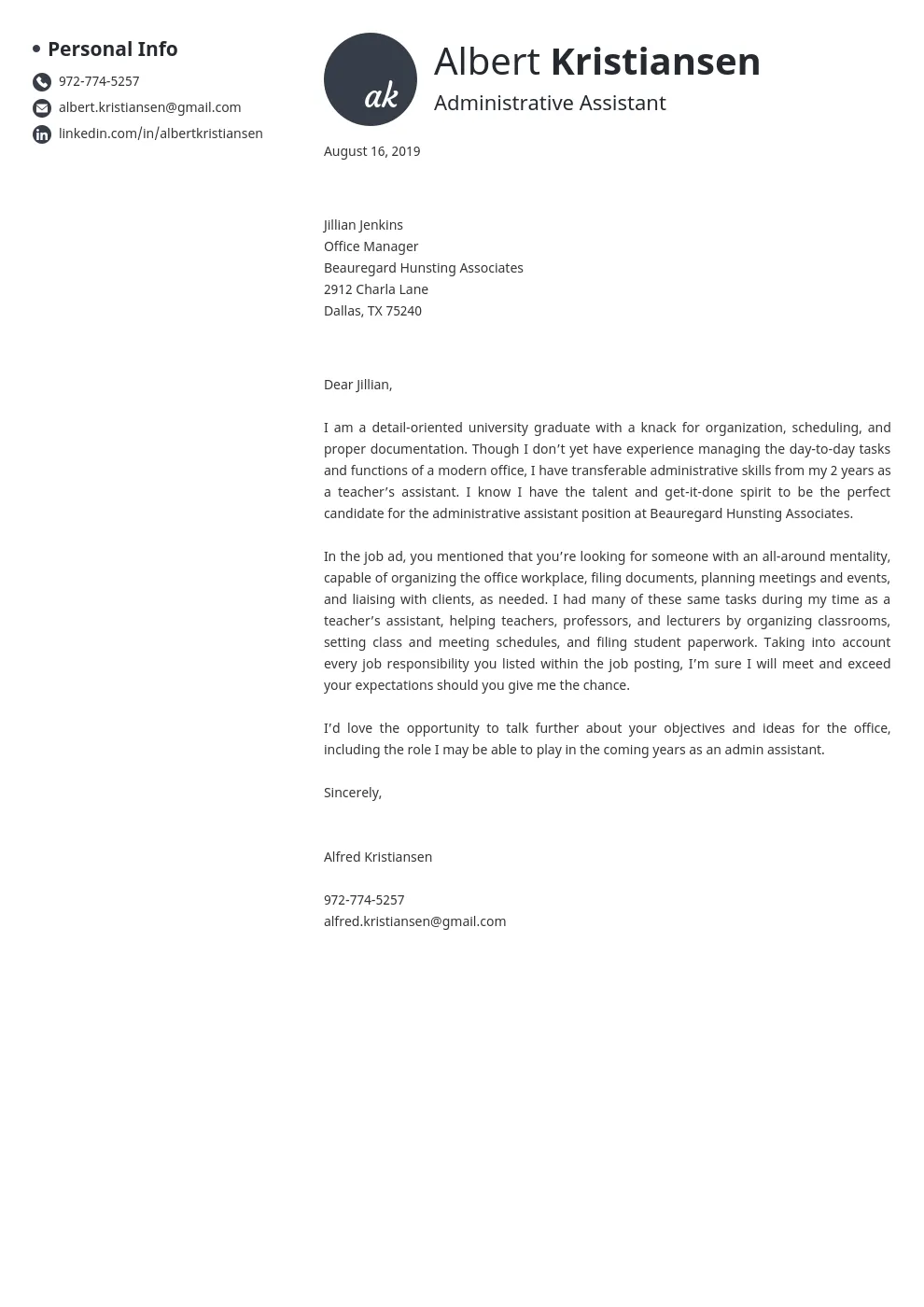What is an Administrative Cover Letter?
An administrative cover letter is a crucial document that accompanies your resume when applying for administrative positions. It serves as your introduction to the hiring manager, providing a concise overview of your qualifications, skills, and experiences. The purpose is to highlight how your background aligns with the specific requirements of the job, demonstrating why you are the ideal candidate. Unlike a resume, which lists facts, a cover letter allows you to showcase your personality, communication skills, and enthusiasm for the role. Think of it as a personalized sales pitch, designed to convince the employer to read your resume and invite you for an interview. A well-written cover letter can significantly increase your chances of landing an administrative job by making a strong first impression and setting you apart from other applicants. Remember to tailor each letter to the specific job description, as a generic one may not capture the hiring manager’s attention.
Why is a Strong Cover Letter Important?
In the competitive landscape of job applications, a strong cover letter is absolutely essential. It’s your first chance to make a positive impression on a potential employer, demonstrating your attention to detail and your understanding of the administrative role. A well-crafted letter goes beyond simply listing your qualifications; it shows how your skills and experiences match the job requirements and what value you can bring to the company. Furthermore, a compelling cover letter allows you to explain any gaps in your employment history or career transitions, addressing potential concerns and showcasing your adaptability. By highlighting your achievements and demonstrating your passion for the administrative field, you can significantly increase your chances of getting noticed and moving forward in the hiring process. Moreover, a cover letter provides an opportunity to showcase your writing and communication skills, vital aspects of any administrative position. A professionally written letter reflects your abilities and makes you a more attractive candidate.
10 Tips to Impress with Your Administrative Cover Letter
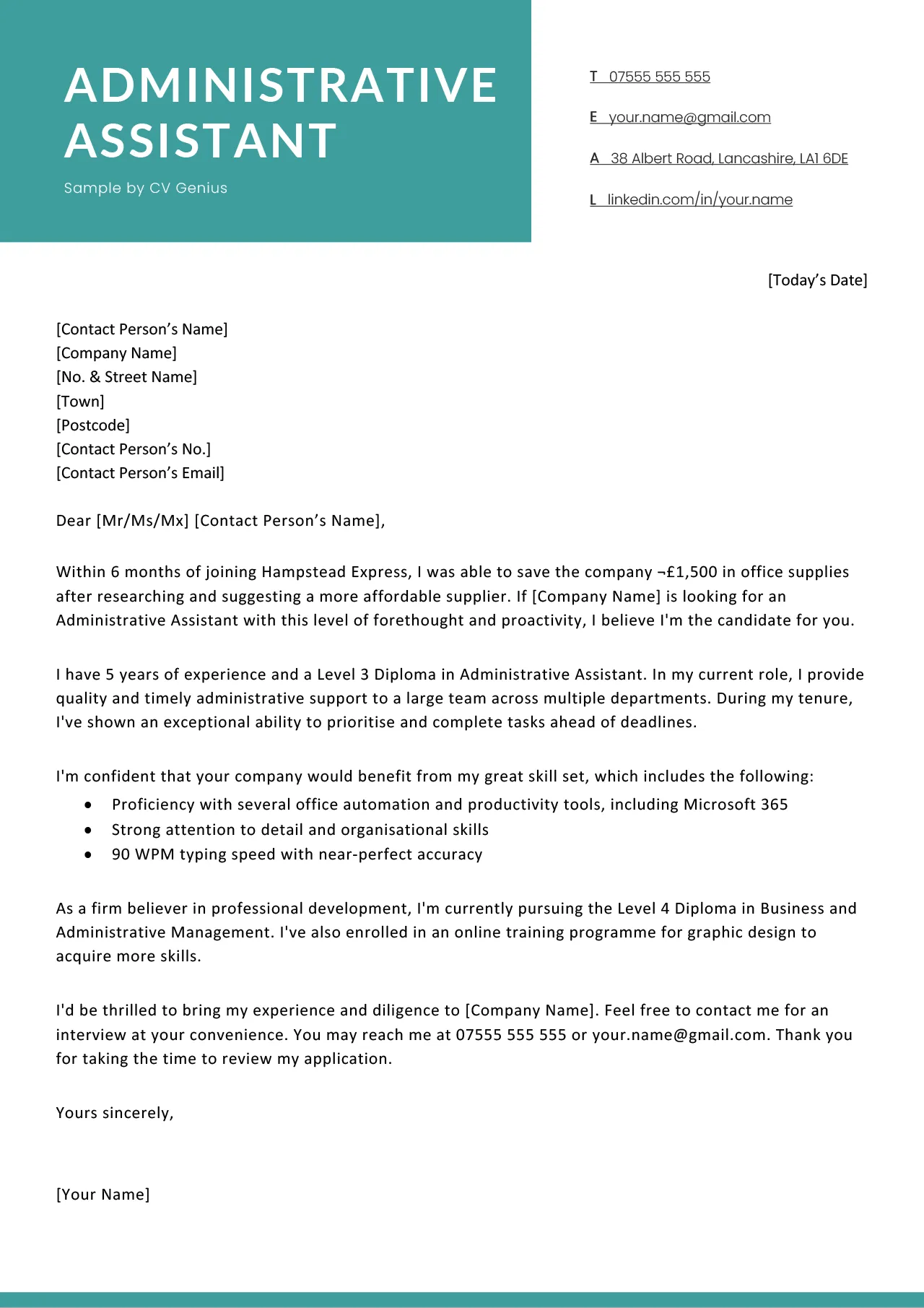
Creating a standout administrative cover letter involves more than just listing your qualifications. It requires a strategic approach that grabs the reader’s attention and effectively communicates your suitability for the role. Below are ten crucial tips to ensure your administrative cover letter impresses the hiring manager and increases your chances of securing an interview. These tips are designed to guide you through crafting a letter that is both informative and engaging, setting you apart from other applicants and highlighting your unique strengths. By implementing these strategies, you can create a cover letter that not only meets but exceeds expectations, showcasing your professionalism and suitability for an administrative position.
Highlight Your Skills and Experience
Focus on the skills and experiences most relevant to the job description. Identify the key requirements mentioned in the job posting and provide specific examples from your past roles where you demonstrated these skills. This could include experience with scheduling, managing correspondence, data entry, or office organization. Instead of simply stating that you have experience, provide concrete examples of how you have successfully utilized these skills. For example, detail how you improved office efficiency through a new filing system or how you streamlined communication processes. Quantifying your accomplishments whenever possible, such as the number of documents processed or the percentage by which you reduced errors, adds credibility and shows the direct impact of your skills. Highlighting your skills and experience this way demonstrates your understanding of the job’s requirements and your ability to perform them effectively.
Tailor Your Letter to the Specific Job
Avoid using a generic cover letter. Customize each letter for the specific job you are applying for. Review the job description carefully and identify the key qualifications, skills, and responsibilities that the employer is looking for. Then, adapt your letter to address these specific needs. Highlight the experiences and skills that are most relevant to the position, using keywords from the job description to demonstrate a direct match. Research the company and understand its values and culture. This will allow you to explain how your goals align with the company’s. This level of customization shows that you have invested time and effort into the application, and are genuinely interested in the role, rather than sending out a mass-produced application. This personalization greatly increases the chances of your cover letter getting the attention it deserves.
Showcase Your Professionalism
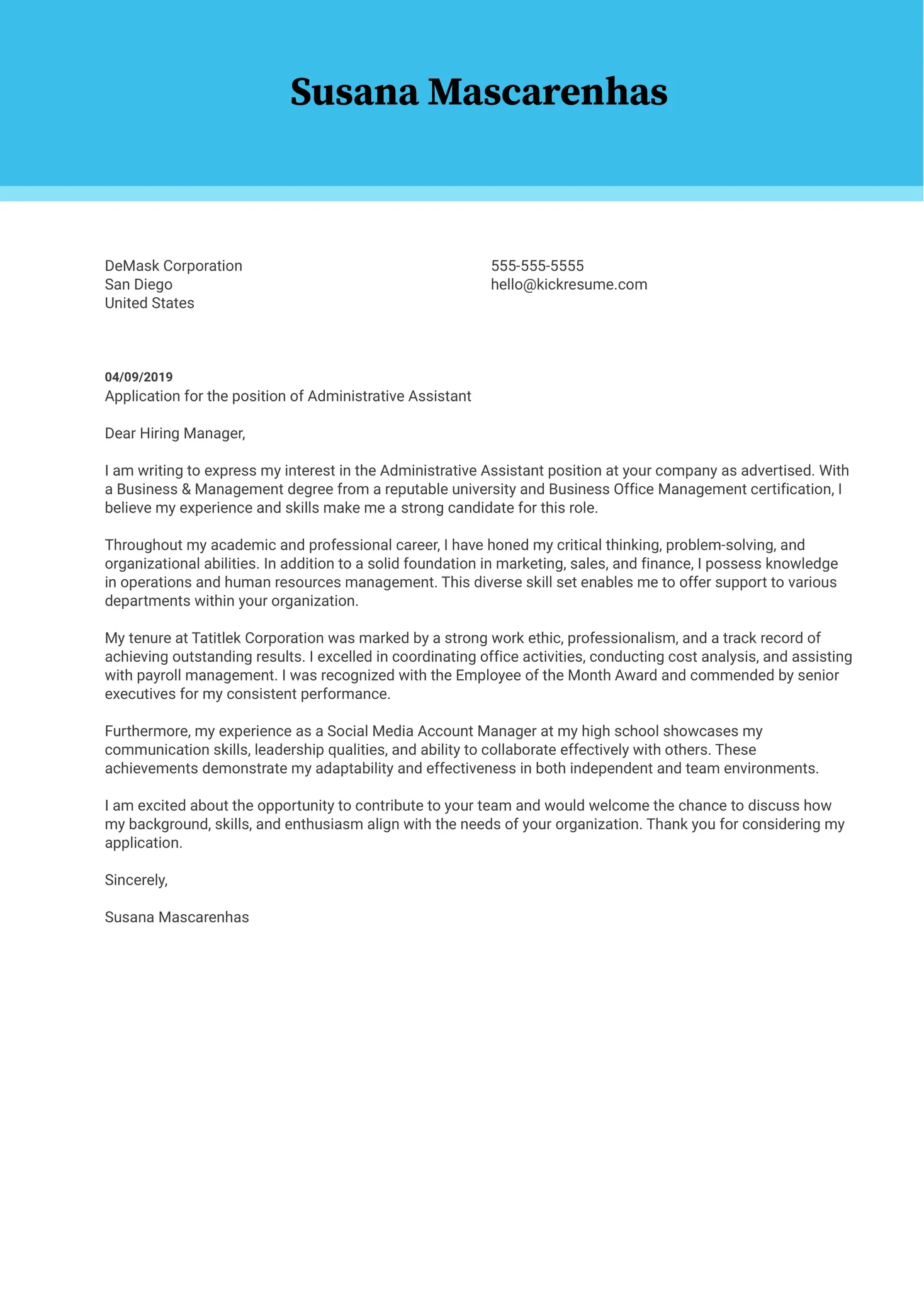
Your cover letter is a direct reflection of your professionalism. Ensure that your letter is well-written, grammatically correct, and free of any typos or errors. Pay close attention to the tone and language you use. Maintain a formal, yet personable tone that reflects the expectations of an administrative role. Use clear, concise language to convey your message. Avoid slang, jargon, and overly casual expressions. Proofread your cover letter multiple times, and ideally, have someone else review it as well. Your cover letter is a representation of your attention to detail, your organizational skills, and your ability to communicate effectively. Demonstrating professionalism from the outset will greatly enhance your credibility and increase your chances of making a positive impression.
Use Action Verbs to Describe Your Accomplishments
Use action verbs to make your descriptions of past accomplishments more impactful. Instead of stating that you ‘were responsible for’ a task, use action verbs such as ‘managed,’ ‘coordinated,’ ‘implemented,’ or ‘streamlined.’ This approach provides a dynamic and engaging way to describe your accomplishments. Action verbs paint a picture of your skills and experience. These words help the hiring manager to understand your responsibilities and contributions more effectively. Make your achievements stand out and demonstrate your capabilities in a clear, concise manner. Including action verbs in your cover letter is a small, yet powerful way to improve your narrative and boost your chances of landing an interview. By using these verbs, you are showcasing your proactive and results-oriented approach, which is highly valued in administrative roles.
Quantify Your Achievements
Whenever possible, quantify your accomplishments to make them more concrete and impressive. Instead of saying you ‘improved efficiency,’ state that you ‘increased efficiency by 15%.’ Quantifiable achievements provide tangible evidence of your abilities and the value you brought to previous roles. Use numbers, percentages, or specific data to demonstrate your impact. For example, instead of saying you ‘managed a project,’ state that you ‘managed a project with a budget of $X and delivered it X days ahead of schedule.’ This approach shows your capacity to meet targets and achieve results. Including quantifiable achievements adds credibility to your claims and makes your cover letter much more persuasive. This shows that you’re not just claiming to be effective; you have the results to prove it.
Demonstrate Your Knowledge of the Company
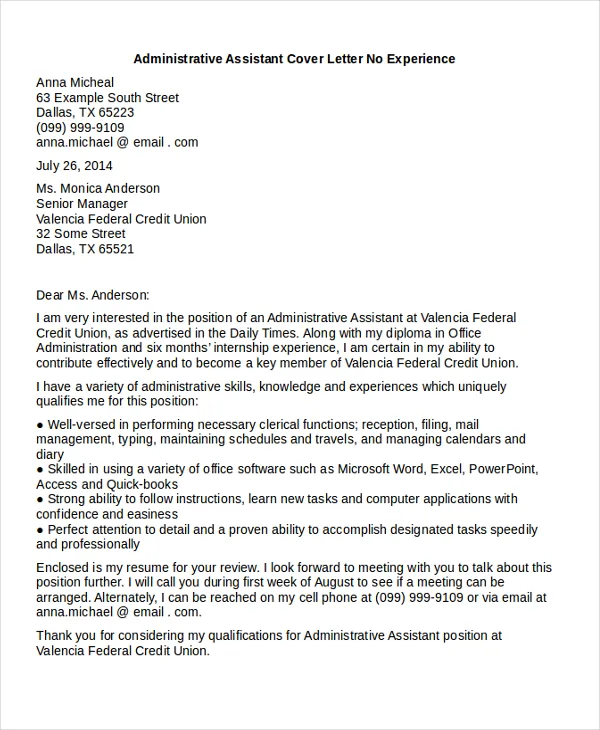
Show the employer that you have done your homework by demonstrating your knowledge of the company. Research the company’s mission, values, recent news, and projects. Tailor your letter to showcase how your skills and experiences align with the company’s goals. Mention specific projects or initiatives that resonate with you, and explain how you could contribute to the company’s success. This level of engagement goes beyond a simple job application; it reveals your genuine interest in the organization. It shows that you are a proactive individual who takes the initiative to learn about the company before applying. This information is useful in setting you apart from the applicants and demonstrating your attention to detail. This effort makes a positive impression on the hiring manager, increasing your chances of standing out from the crowd.
Proofread and Edit Carefully
Proofreading and editing are non-negotiable parts of creating a professional cover letter. Errors in grammar, spelling, or punctuation can immediately undermine your credibility and suggest a lack of attention to detail. Review your cover letter multiple times, ideally a few days after writing it. Use spell-check and grammar-check tools, but don’t rely on them completely; they won’t catch all errors. Have a friend or colleague review your letter to catch any mistakes you may have missed. Pay attention to the structure, flow, and clarity of your writing. A well-proofread and edited cover letter demonstrates your professionalism, your writing ability, and your commitment to excellence. Making sure that your letter is perfect conveys a strong message that shows you’re attentive to details, a highly valued trait for administrative positions.
Include a Call to Action
Conclude your cover letter with a clear call to action, encouraging the hiring manager to take the next step. Express your interest in an interview and provide your contact information, making it easy for the employer to reach you. Be proactive by stating that you’re eager to discuss how your skills and experience align with their needs. This could involve reiterating your enthusiasm for the position or highlighting key points from your letter. Provide your contact details in a professional and easy-to-read format, so the hiring manager can contact you with ease. By including a call to action, you encourage the employer to take action and move forward with your application. The call to action helps move your application to the interview stage and increases your chances of being contacted.
Formatting Your Cover Letter for Impact
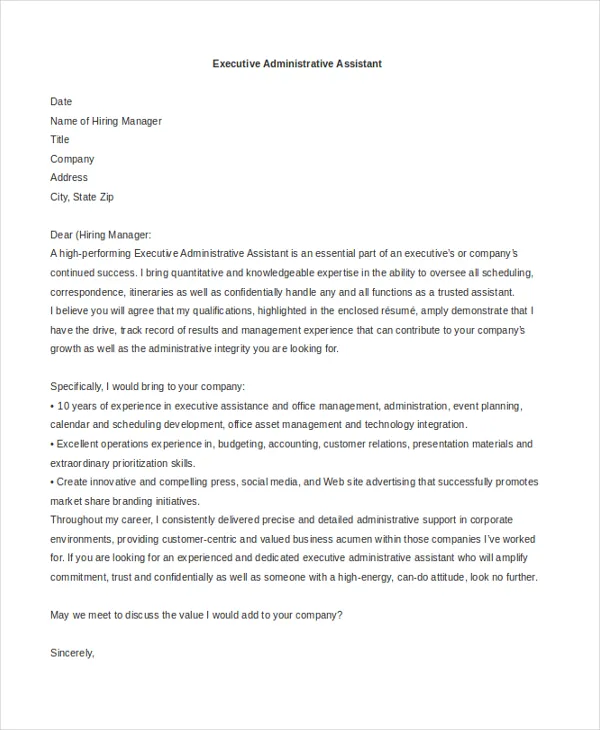
The formatting of your cover letter is as important as its content. Ensure your letter is easy to read and visually appealing. Use a professional font like Times New Roman, Arial, or Calibri in a standard size (11 or 12 points). Maintain consistent formatting throughout the document. Use clear spacing and margins to create a clean layout. A well-formatted letter shows attention to detail and respect for the reader’s time. Poor formatting can distract from your message. Proper formatting ensures your cover letter is accessible and showcases your professionalism. This simple step can significantly improve the impact of your letter and increase your chances of success.
Choose a Professional Font and Format
The choice of font and format can significantly influence the impression your cover letter makes. Choose a standard, easy-to-read font such as Times New Roman, Arial, or Calibri. Avoid using overly stylized or decorative fonts that might be difficult to read. Set your font size to 11 or 12 points to ensure the text is easily readable. Maintain consistent spacing throughout your cover letter. Use clear margins to provide ample white space around the text, which enhances readability. By following these guidelines, you can make certain that your cover letter is simple and accessible to potential employers. Your choice of a professional font demonstrates your attention to detail. It contributes to a professional appearance that communicates your commitment to excellence.
Keep it Concise and Easy to Read
Keep your cover letter concise and easy to read. Aim for a length of one page, focusing on the most important information. Use short paragraphs, and avoid long, dense blocks of text. The goal of your cover letter is to provide a brief overview of your qualifications and to encourage the reader to review your resume. Use clear and straightforward language. Avoid overly complex sentences or jargon that might confuse the reader. Break up large blocks of text with bullet points or lists to make your letter more visually appealing and easier to scan. Being concise and accessible demonstrates your respect for the reader’s time. It communicates your ability to organize your ideas efficiently, a crucial skill in administrative roles. Your ability to be concise and easy to read will make it more likely that your cover letter is read completely.
Common Mistakes to Avoid
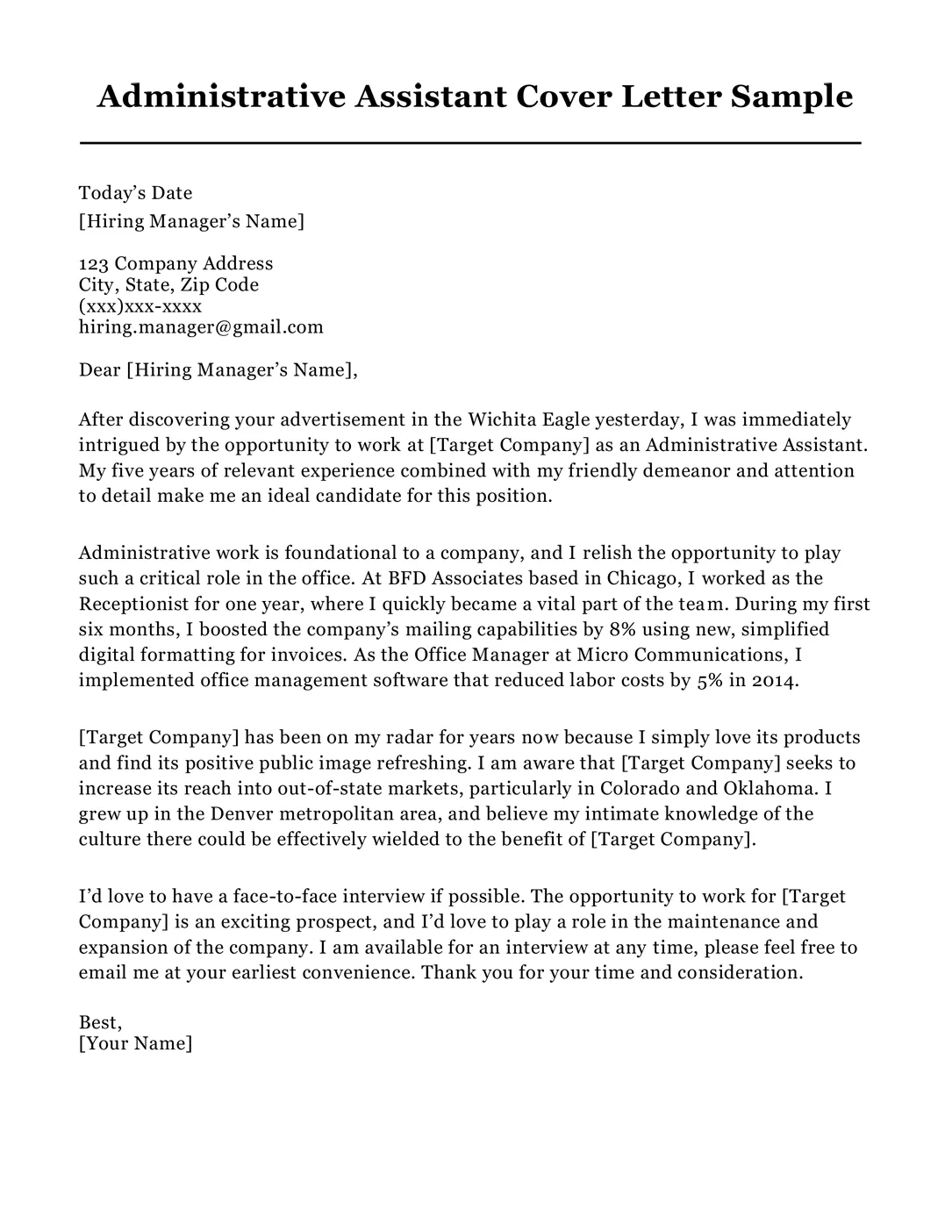
While crafting your administrative cover letter, it’s vital to avoid common mistakes that can undermine your application. Recognizing and steering clear of these errors will ensure that your cover letter showcases your strengths and increases your chances of landing an interview. Avoid these common missteps to ensure your application stands out from the competition. Being aware of these common pitfalls will help you make the strongest possible impression on potential employers.
Generic Salutations and Closings
Avoid using generic salutations and closings. Instead of starting your letter with ‘To Whom It May Concern,’ try to find the hiring manager’s name and address your letter directly to them. It demonstrates that you’ve done your research and have personalized your application. For closings, phrases like ‘Sincerely,’ ‘Best regards,’ or ‘Thank you for your time’ are preferred over more informal options. A personalized salutation and closing provide a more professional and personal touch, setting you apart from other applicants and showing your attention to detail. These seemingly small elements can have a significant impact on the impression your cover letter creates.
Focusing on Yourself Rather Than the Employer’s Needs
Your cover letter should focus on how you can benefit the employer, not just your own needs and wants. Make sure your letter reflects how your skills and experiences meet the company’s requirements. Instead of writing about your career goals, explain how your qualifications align with their needs and the value you can bring to the role. Frame your experiences and accomplishments in terms of the impact they will have on the organization. A cover letter that prioritizes the employer’s needs demonstrates your understanding of the job’s requirements. This shows that you’re focused on contributing to the company’s success. Shift the focus towards how you can solve their problems and achieve their goals.
Failing to Proofread
One of the most damaging mistakes is failing to proofread your cover letter. Errors in grammar, spelling, or punctuation can instantly diminish your credibility. Make sure you read your cover letter carefully and have someone else review it too. A poorly proofread letter suggests a lack of attention to detail, which is critical for administrative positions. If your cover letter contains mistakes, the hiring manager could make a negative judgement about your writing skills. Proofreading ensures that your qualifications are represented. Make sure that your application is not undermined by simple errors. The extra effort ensures you make a strong professional impression.
Key Takeaways for an Effective Administrative Cover Letter
Creating an effective administrative cover letter is a key step in the job application process. Your letter should be tailored to each role, highlighting your skills and experiences that align with the job requirements. Use action verbs to describe your accomplishments, and quantify your achievements whenever possible. Demonstrate your knowledge of the company and present a well-formatted, concise, and easy-to-read letter. Make sure that you proofread and edit it carefully. Avoid common mistakes like generic salutations and closings or focusing solely on yourself. Include a clear call to action, and always maintain a professional tone. By following these tips, you can create a compelling cover letter that grabs the hiring manager’s attention and increases your chances of getting an interview. This attention to detail will make your application stand out.
